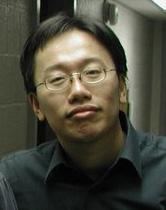For years, Dana Nieder has been trying to figure out why her daughter Maya suffers from extreme developmental delays. Now 4 years old, Maya is unable to speak, and has already had multiple surgeries. Countless doctors told Nieder that “something genetic” was at the root of Maya’s problems, but six genetic screenings failed to confirm their hunch.
Enter TED Fellow Jimmy Lin.
The founder of the Rare Genomics Institute, Lin seeks to help families like the Nieders who are looking for genetic answers unlikely to be found through traditional research because a condition is so rare. The Rare Genomics Institute allows patients and their families to appeal to others on the internet and crowdsource funds for genetic research.
An online campaign was kicked off on Maya’s behalf last December. Six hours later, donors from across the country had chipped in $5 to $50 each and raised $3,500—enough for Maya’s genome to be sequenced along with those of her parents in a hunt for the gene behind her ailments.
Late last week, a breakthrough finally came. RGI researchers noticed a mutation in a gene, active during fetal development, that has never been documented in medical literature before. The mutation could be the cause of Maya’s illness.
“We have our first gene discovery!” Lin excitedly posted on Facebook.
 “Our research partners at Yale have discovered a brand-new gene in a child we’re helping — possibly a new disease!” Lin (pictured at right) wrote. “We think this is the first gene discovery via crowdfunding.”
“Our research partners at Yale have discovered a brand-new gene in a child we’re helping — possibly a new disease!” Lin (pictured at right) wrote. “We think this is the first gene discovery via crowdfunding.”
Lin warns that much more research is needed into the gene and how it works. But the discovery has given the Nieders a potential answer, as well as the possibility for the development of therapies to help Maya. And should another child show the same mutation in the future, since the gene has now been documented, it’s unlikely that their parents will have to jump through the same hoops.
“The most exciting thing is that we are enabling research that would not exist otherwise,” says Lin, who prior to starting the Rare Genomics Institute worked on cancer genome sequencing at the Vogelstein Lab at Johns Hopkins. As Lin points out, an estimated 250 million people worldwide suffer from a rare disease, very few with cures.
Maya’s mother, Dana Nieder, writes the popular blog Uncommon Sense. And last week, after hearing the news, she wrote, “When you’ve been looking for the answer for three and a half years, you don’t really expect one anymore.”
Photo courtesy of: Dana Nieder

Comments (5)
Pingback: US Steroids for Sale
Pingback: Rare gifts: Fellows Friday with C Jimmy Lin | Krantenkoppen Tech
Pingback: Rare gifts: Fellows Friday with C Jimmy Lin | H Tanalepy
Pingback: The Rare Disease Challenge: A $400K contest for research | Krantenkoppen Tech